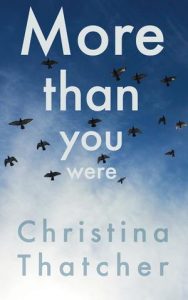Losing a parent is hard and when it happens, it’s tough. It brings a glut of unexpected emotions and without a doubt, More than you were, Christina Thatcher’s debut poetry collection, deals with the death of her father in a beautiful, heartfelt way.
Thatcher, an American Ph.D student at Cardiff University, has written More than you were as a response to her father David’s death, in 2013, from a drugs overdose. Not knowing the deceased does not make the collection any less impactful. In fact, the poems deal with Thatcher’s grief in a multitude of ways from constructing her father’s obituary through to cleaning out his apartment.
In the opening poem, ‘First Drafts’, Thatcher explores the process of writing a suitably respectful piece for her father – and how, after she’d ‘read hundreds of them…’ she didn’t want her father ‘to look bad next to the other obituaries’. Further in the past is ‘Day One’ – and the room being ‘like molasses’ is poignant: time takes on a new meaning. It’s not something that can be imagined, or easily understood.
Interspersed throughout are ten ‘lessons’ – learning points, often focusing on what Thatcher learnt from her father, or has realised since he died. In ‘Lesson #3’, David Thatcher told his daughter that ‘some things were never mean to be loved.’ In ‘Lesson #5’, he kills eels, en masse, and explains this as a kind gesture. But learning is not just restricted to the ‘lessons’. In ‘There’, Thatcher realises how much her father was to her – ‘the everything in that room’. The disconnect of the nouns ‘expert, alchemist, front man composing lasagna’ show how much he meant to her – and how much fathers mean to many of us. In ‘Anticipation’, the focus is less positive – waiting for something that never comes. Thatcher was desperate for ‘the taste of cinnamon’ chewing gum but such desire was futile. It is fascinating how the adult memory can hang on to glimpses into the yesteryear of childhood. If only all responsible adults followed through with their promises.
Thatcher’s poems are short, often one-stanza affairs, each one conveying strong emotions that only the bereaved can ever fully understand. ‘Shaking hands at a funeral’ is reminiscent of Seamus Heaney’s ‘Mid-Term Break’ – the main difference being Thatcher writes about death’s impact on an adult, whereas Heaney wrote as a child. But the fall out (‘death would strip me, leave me barren, like winter’) is the same. The tragedy of getting older, with funeral attendance being the norm, is clear in ‘Multiples’. In ‘Sharing’, a warmer sense is felt – where Thatcher debates where to scatter her father’s ashes, listing beautiful potential locations in her adopted Wales.
What really rings true in this collection is the contrast between what was and what could have been. In ‘Out’, there is a strong element of wondering – with reference to ‘bottles of Bud’. One can’t help feeling empty with the thought of wasted opportunities. But this doesn’t stop Thatcher reminiscing – particularly when it is the anniversary of her father’s birthday in ‘When you sneak up on me’. The longevity of grief’s impact is evident here, as it is in ‘Echo’ with its sense of finality – with ‘Everything being paid up.’ After a loved one dies, there is a lot to organise, alongside the grieving and emotions. Even though such jobs can be unwanted and tempting to ignore, their completion leaves a sense of everything being done.
Towards the end of the collection, Thatcher reflects on the present day. In ‘On learning to help myself’, she uses the analogy of ‘luck’ – and that she doesn’t have to rely on this in order to have a good life. Finality is confronted in ‘Your estate has closed’ – and in ‘Resilience’, accepting the truth (and internalising the loss) is tackled. The concluding poem, ‘Finding You’, sees Thatcher returning to one of her father’s old haunts and the impact a guitar has on her. It is a reminder to us all that the small things in life can cause the strongest emotions.
Having recently lost my own father, albeit in very different circumstances, More than you were hit home. The collection should be read as a whole, such are the effects of grief. Thatcher candidly writes about the myriad ways that a parent’s death can affect a child – and no matter the situation, her writing is beautifully executed and deserves to be absorbed slowly, with consideration and a sense of peace.
Matthew Tett is a freelance writer and teacher based in the south-west of England. He is Reviews Editor for NAWE’s Writing in Education and writes for various publications, including the Cardiff Review.
You can buy your copy of More than you were by Christina Thatcher here: https://www.parthianbooks.com/products/more-than-you-were

